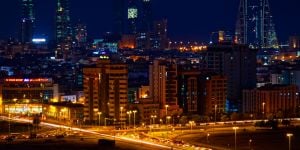
Bahrain, a dynamic island nation in the Arabian Gulf, features a sophisticated transportation network that seamlessly combines tradition with modernity. Despite its small size, Bahrain's strategic location has turned it into a connectivity hub with a well-maintained road system and diverse commuting options. This guide explores Bahrain's evolving transport infrastructure, from public buses and taxis to upcoming rail projects, catering to both residents and the substantial expatriate community.
Public transport in Bahrain
Bahrain's public transportation system is steadily improving, offering viable options for residents who prefer not to drive.
Bus network
Bahrain's bus network, managed by the Bahrain Public Transport Company, covers major routes across the island. The buses are equipped with air conditioning, making them a comfortable option for daily commutes.
Regular bus users can purchase a GO Card, which allows for easy and convenient travel across the network. GO Cards are available at ticket offices, vending machines, and select retail outlets.
Taxis and ride-hailing services
Taxis in Bahrain are easily recognizable with clear "Taxi" signage and can be hailed directly on the street or found at designated stands outside hotels and shopping malls. The Ministry of Transportation and Telecommunications regulates taxi fares, which vary based on the time of day and distance traveled. Taxis calculate fares using a meter.
During weekdays (Sunday to Thursday from 6:00 AM to 10:00 PM), the starting fare is BD 1.000 (approximately USD 2.65), with a per-kilometer rate of 200 fils (approximately USD 0.53) for the first half of the journey and 250 fils (approximately USD 0.66) for the second half. At night (10:00 PM to 6:00 AM), on weekends, and public holidays, the starting fare rises to BD 1.250 (approximately USD 3.31), although per-kilometer rates remain the same.
Additional fees include BD 2.000 (approximately USD 5.31) for long-distance trips over 25 km, an airport pickup surcharge of BD 2.000 (approximately USD 5.31), and BD 1.000 (approximately USD 2.65) for hotel pickups or journeys on public holidays. Waiting charges are set at 50 fils (approximately USD 0.13) per minute, with a minimum fare of BD 2.000 (approximately USD 5.31) applying to all trips. For accurate fare calculation, ensure the taxi meter is activated at the start of your ride. For the latest official information, refer to the Ministry of Transportation and Telecommunications.
Popular ride-hailing apps, such as Uber and Careem, provide convenient alternatives to traditional taxis. These apps offer transparent pricing, estimated fares, and tracking, making them a popular choice among residents and visitors.
For a cheaper option, shared taxis (marked with a yellow circle) are also available. These taxis do not use meters, so passengers should negotiate the fare before starting the journey.
Rail and metro developments in Bahrain
Although Bahrain currently lacks a functioning rail network, plans are in place to introduce a metro system that will significantly enhance public transportation options.
Phase one
The proposed metro system aims to connect key areas, such as Bahrain International Airport and Seef, reducing traffic congestion and providing an efficient alternative for commuters.
Future phases
Future metro phases are expected to expand coverage to other parts of the island, further improving connectivity and making public transport a more attractive option for daily commutes.
GCC Railway Project
Bahrain is part of the ambitious Gulf Cooperation Council (GCC) railway project, which aims to create a rail network linking member states.
The GCC railway project is designed to facilitate trade, tourism, and transportation across the region. It will include passenger and freight services, enhancing connectivity between Bahrain and neighboring countries such as Saudi Arabia, the UAE, Qatar, Kuwait, and Oman.
While the project has experienced delays, Bahrain remains committed to this regional initiative, which is expected to transform transportation and logistics across the Gulf.
Driving and car ownership in Bahrain
Driving is the most popular mode of transportation among expatriates in Bahrain, offering a level of independence that is not easily matched by other transport options. For long-term residents, acquiring a local driver's license is recommended, while short-term visitors can use their national or international licenses for a limited time.
Advantages of car ownership
Owning a car in Bahrain offers unparalleled flexibility, allowing drivers to explore remote parts of the island that are not well-serviced by public transportation. This is particularly helpful for those who enjoy impromptu trips to Bahrain's diverse attractions.
Given Bahrain's extremely hot summers, driving a personal car with air conditioning provides a significant comfort advantage over other modes of transportation, making it a preferred option.
For families, owning a car is not just convenient but essential. Transporting children to school, extracurricular activities and family outings are more practical with a personal vehicle, eliminating the constraints of bus routes or taxi schedules.
From beaches and parks to entertainment venues, Bahrain offers numerous recreational spots. Having a car makes accessing these locations easy and allows residents to enjoy spontaneous weekend getaways without worrying about public transport availability or schedules.
Options for purchasing a car in Bahrain
Expats considering buying a car in Bahrain have several options to choose from.
New cars
Bahrain has a wide range of international car brands, including Toyota, Nissan, Honda, and BMW, all of which have authorized dealerships. The advantage of buying a new car is that it usually comes with a warranty and the option to customize certain features. Most dealerships also offer financing plans with flexible repayment options, making it easier to purchase a new vehicle.
Used cars
The used car market is vibrant and offers a more budget-friendly alternative. Cars can be purchased through dealerships, private sellers, or online platforms. YallaMotor Bahrain offers a comprehensive selection of pre-owned cars, complete with detailed specifications and images, facilitating an informed decision-making process. Another notable platform is Dubizzle Bahrain (OLX), which provides a wide array of used cars for sale, allowing users to connect directly with sellers through local classified ads. For those interested in a diverse range of vehicles, Bahrain Auto Trader serves as a valuable resource, featuring listings for both new and used cars, as well as motorcycles and boats. Additionally, OpenSooq Bahrain presents a user-friendly interface for browsing thousands of car listings, catering to various preferences and budgets. These platforms are regularly updated, ensuring access to the latest listings and facilitating a seamless car-buying experience in Bahrain.
However, it's important to conduct a thorough inspection of the vehicle's condition and history before finalizing the purchase.
Car leasing
Leasing provides the benefit of using a car without committing to full ownership. Leasing terms are usually flexible, ranging from 12 to 36 months, and include maintenance services, insurance, and other perks. This option is particularly popular among expatriates on temporary assignments.
Documentation and licensing
To own a car in Bahrain, expatriates must complete several steps and provide the following documentation:
Long-term residents should obtain a Bahraini driver's license, either by converting an international license or by passing a driving test.
After purchasing a car, it must be registered at the Traffic Department. This process involves submitting proof of purchase, insurance, and identification documents.
Car insurance is mandatory, with options ranging from basic third-party liability to comprehensive coverage. It's advisable to compare rates and coverage options to ensure the best protection.
For used cars, a roadworthy certificate is often required to confirm that the vehicle meets safety and emissions standards.
Upon successful registration, the car will receive license plates, which must be displayed at the front and back.
Driving regulations and safety in Bahrain
Bahrain has well-defined driving laws that are enforced to ensure safety and order on the roads.
Speed limits vary depending on the area, with limits set at 50–70 km/h in urban areas, 80–100 km/h in rural zones, and 100–120 km/h on highways. Violations, especially speeding, can result in fines or other penalties.
It is illegal to use mobile phones while driving unless a hands-free device is used. This law aims to reduce distractions and enhance road safety.
Children under ten must sit in the back seats, and younger children should be in appropriate car seats to ensure safety.
At a minimum, drivers must have third-party liability insurance, though comprehensive coverage is recommended for broader protection.
Car maintenance in Bahrain
Owning a car comes with responsibilities, including regular maintenance to ensure safety and longevity:
Routine maintenance, such as oil changes, filter replacements, and brake checks, is essential. Many authorized dealers offer servicing packages that include a full range of checks and necessary repairs.
Cars that are over five years old are subject to annual inspections to ensure compliance with safety and emission standards. These inspections take place at authorized centers and are required for vehicle registration renewal.
Bahrain has one of the lowest gasoline prices in the region due to government subsidies. Fuel stations are abundant and offer additional services like car washes and convenience stores.
Parking is generally easy to find, though it can be more challenging in densely populated areas. Many malls, hotels, and entertainment centers offer free parking, while paid parking is common in the busiest parts of Manama.
It is advisable to keep an emergency kit in the car, including a spare tire, jack, first aid supplies, and water. This ensures preparedness in case of a breakdown.
Car rentals and lease-to-own options in Bahrain
Car rental
Car rental services are widely available in Bahrain and cater to both short-term visitors and long-term residents.
Major car rental companies, such as Hertz, Budget, and Avis, operate in Bahrain, offering a range of vehicles from economy models to luxury cars. Rental terms are flexible, with daily, weekly, or monthly options available.
Renting a car typically requires a valid driver's license, proof of identity, and a credit card. Some agencies may require a local driver's license for long-term rentals. Given that a driver's license is required to rent a car, cars are usually only leased to people of driving age with a valid license.
Most rental cars come with basic insurance coverage, though additional insurance can be purchased for extra protection.
Lease-to-own options
For expatriates who prefer the benefits of owning a car but don't want to commit to an immediate purchase, lease-to-own programs offer a middle ground.
Lease-to-own arrangements allow individuals to lease a car for a set period, usually 24 to 48 months, with the option to buy the car at the end of the term. This approach provides flexibility, making it easier for expatriates to manage their finances while still having access to a personal vehicle.
Lease-to-own agreements often include maintenance, insurance, and registration services, simplifying the ownership process. Payments are spread over the lease term, making it more affordable than a direct purchase. Moreover, drivers can opt for newer models at the end of each lease term.
However, while lease-to-own options offer flexibility, the total cost of the vehicle may be higher than an outright purchase. It's essential to review the terms of the lease carefully, including any fees for early termination or mileage limits.
Useful links:
Bahrain Public Transport Company
We do our best to provide accurate and up to date information. However, if you have noticed any inaccuracies in this article, please let us know in the comments section below.








